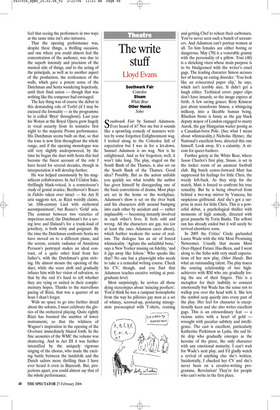The write stuff
Lloyd Evans
Southwark Fair Cottesloe Steam White Bear Other Hands Soho
Southwark Fair by Samuel Adamson. Ever heard of it? Nor me but it sounds like a sprawling comedy of manners written by some forgotten Enlightenment wag. I trotted along to the Cottesloe full of expectation but I was in for a let-down. Samuel Adamson is no wag. Nor is he enlightened. And as for forgotten, well, it won’t take long. The play, staged on the South Bank of the Thames, is also set on the South Bank of the Thames. Good idea? Possibly. But as the action unfolds you quickly see what trouble the author has given himself by disregarding one of the basic conventions of drama. Most plays are set in the home or the workplace. Adamson’s show is set on the river bank and his characters drift around bumping into each other by accident and — rather implausibly — becoming instantly involved in each other’s lives. It feels odd and wrong. All the characters are gay, too (or at least the ones Adamson cares about), which further weakens the sense of realism. The dialogue has an air of forced whimsicality. ‘Agitate the unfaithful bone,’ says a New Yorker musing on fidelity, ‘and it jigs away like Jolson.’ Who speaks like that? No one but a playwright who needs to take a a remedial writing course. Check his CV, though, and you find that Adamson teaches creative writing at postgraduate level.
Most surprisingly, he revives all those dying stereotypes about ‘mincing poofters’. You’d think he was a rampant homophobe from the way he pillories gay men as a set of whiney, screwed-up, posturing misogynists preoccupied with T-shirts, cruising and getting Chef to reheat their carbonara. You’ve never seen such a bunch of screamers. And Adamson can’t portray women at all. To him females are either boring or dangerous. May (70) is a venerable granny with the personality of a pillow. Toni (40) is a shrieking vixen whose main purpose is to be bludgeoned with the writer’s cruel gags. The leading character Simon accuses her of having an eating disorder. ‘You look like an eviscerated paper clip,’ he says, which isn’t terribly nice. It didn’t get a laugh either. Technical error: paper clips don’t have innards, so the image expires at birth. A few saving graces: Rory Kinnear just about transforms Simon, a whingeing milksop, into a likeable human being. Rhashan Stone is funny as the gay black deputy mayor of London engaged to marry Aurek, the gay Hungarian waiter posing as a Canadian-born Pole. (See what I mean about whimsicality.) Nicholas Hytner, the National’s excellent boss, directed this one himself. Look away. It’s a calamity. A sitcom for queer-bashers.
Further gaiety at the White Bear, where Jason Charles’s first play, Steam, is set in the locker room of an amateur football club. Big butch centre-forward Matt has suppressed his feelings for little Chris, the weedy left-back. As they strip for the match, Matt is forced to confront his true sexuality. But he is being observed from behind a two-way mirror by Vanessa, his suspicious girlfriend. And she’s got a surprise in store for little Chris. This is a powerful debut, a psychological thriller with moments of high comedy, directed with great panache by Toria Banks. The sellout run has already ended but it will surely be revived elsewhere soon.
In 2005 the Critics’ Circle garlanded Laura Wade with the title Most Promising Newcomer. Usually that means Most Over-Hyped Future Has-Been, and I went along to the Soho with very small expectations of her new play, Other Hands. But what an outstanding talent. The play traces the souring relationship of two highachievers with RSI who are gradually losing the use of their fingers. This is a metaphor for their inability to connect emotionally but Wade has the sense not to wallop you over the head with it. She lets the symbol seep quietly into every part of the play. Her feel for character is exceptionally keen and she also writes excellent gags. This is an extraordinary feat — a vicious satire with a heart of gold wrought with peculiar subtlety and intelligence. The cast is excellent, particularly Katherine Parkinson as Lydia, the sad little drip who gradually emerges as the heroine of the piece, the only character with any emotional maturity. I can’t wait for Wade’s next play, and I’d gladly watch a revival of anything else she’s written. Incidentally, I checked her CV and she’s never been on a creative-writing programme. Revelation! They’re for people who can’t write in the first place.


































































 Previous page
Previous page